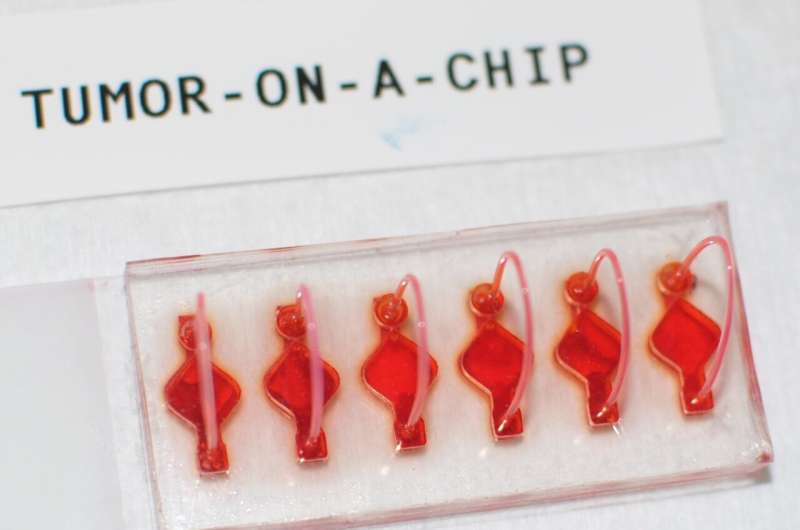Researchers create specific cancer organoid system to study bacterial effects on immunotherapy

Wake Forest Institute for Regenerative Medicine (WFIRM) researchers are using a tumor organoid system to examine the effects of metabolites secreted by bacteria on a specialized immunotherapy—immune checkpoint blockage, a promising cancer treatment development—to determine why some patients don't respond or develop a resistance to the treatment over time.
According to Cancer.gov, immune checkpoints are a normal part of the immune system that engage when proteins on the surface of immune cells, called T cells, recognize and bind to partner proteins on other cells, including tumor cells. When this happens, an "off" signal is sent to the T cells and prevents the immune system from destroying the cancer cells. Immunotherapy drugs work to block the binding and the "off" signal from being sent so that T cells can do their job and kill cancer cells.
Immune checkpoint blockade therapy has demonstrated good results in many cancer types, including non-resectable advanced or metastatic triple-negative breast cancer and been recently approved as a promising treatment. However, clinical data shows that about 40 percent of breast cancer patients do not respond to the therapy.
"Immune checkpoint blockade immunotherapy is one of the newest and most promising developments in cancer treatment," said Konstantinos I. Votanopoulos, MD, Ph.D., professor of surgery at the Atrium Health Wake Forest Baptist Comprehensive Cancer Center and director of the Wake Forest Organoid Research Center (WFORCE), a joint venture between WFIRM and the cancer center. "It can show profound effects in patients who respond; however, a large portion of patients display either a total lack of response or develop a resistance to the treatment over time and we need to understand why."
By incorporating immune system elements from the patient into tumor organoids, "we can now study the unique and complex interactions between tumor, immune system and microbiome," Votanopoulos added.
The human microbiome and its role in cancer, and specifically how it affects response to therapies such as immunotherapy, is an emerging area of research interest. The human microbiome is composed of microbes—viruses, bacteria and fungi –– that reside within the body and work in support of proper physiological functioning. It is often described as an invisible system within the human body that is affected by the genetics, geography, food and lifestyle of the human host, and the science community's understanding of it is in its infancy.
In this study, recently published in Scientific Reports, the research team created a novel tumor organoid system that contains important components of the immune system in order to study microbiome-associated factors affecting the response to immune checkpoint blockade. The team was able to show that some of these bacterial-released factors (metabolites) improved immune cell viability and changed gene expression to prime the system for a more complete immune response, thereby increasing treatment efficacy.
Shay Soker, Ph.D., who leads the organoid research team at WFIRM and is co-director of WFORCE, said the results validate the immune-enhanced tumor organoid system as a physiologic duplicate representing the in vivo state of the tumor microenvironment.
"Further understanding of the relationship between specific bacterial metabolites and overall response to immune checkpoint blockage could be used to push for positive potential outcomes," Soker said. "Procedures such as fecal transfer or diet modification could also effectively induce a more conducive microbiome for therapy."
Soker and Votanopoulos said that more data is required to determine the relationship between these receptors, the bacterial metabolites, and therapeutic response. Further use of this model with patient-derived cells will help demonstrate the full effects of these factors, they added.
"These results suggest that further development of this model will eventually be an important clinical tool in designing and analyzing future trials for anti-cancer treatments," said WFIRM Director Anthony Atala, MD. "Our goal is to integrate the immune-enhanced tumor organoid platform into the treatment decision process to better treat patients."
Additional co-authors include: Ethan Shelkey, David Oommen, Elizabeth R. Stirling, David R. Soto-Pantoja, Katherine L Cook and Yong Lu. The authors declare no competing interests.
More information: Ethan Shelkey et al, Immuno-reactive cancer organoid model to assess effects of the microbiome on cancer immunotherapy, Scientific Reports (2022). DOI: 10.1038/s41598-022-13930-7




















